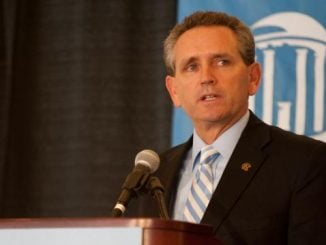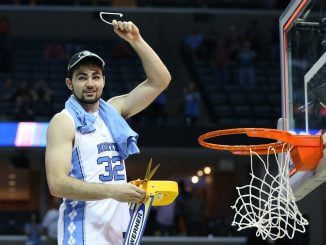In late November 1997, Mack Brown announced that he was leaving UNC after 10 seasons as head coach. That same week, former NC State basketball star and current Dallas Maverick Dennis Smith Jr. was born. National League Rookie of the Year Ronald Acuña was born a few weeks later.
In other words, it’s been a while since Brown has been in North Carolina. After a wild three days in Chapel Hill, however, Mack is back, coaching the Tar Heels.
The surprise hiring gives UNC Hall of Fame coaches in the two highest-profile sports — men’s basketball and football — as well as women’s basketball, women’s soccer, softball and field hockey.
“He has won a national championship in football,” athletic director Bubba Cunningham said, “and he’s joining nine other coaches (at UNC) who have won national championships.”
Many of the other coaches were around when Brown was at UNC the first time.
“We know so many people,” Brown said. “So many people stayed in place. Bubba set up a meeting with all the other coaches this morning and … nobody left! They look a little older, but they’re still here, still winning games.”
Brown’s absences — from UNC and the sidelines — are concerns. He returns to the school after more than two decades, the last five spent in retirement after stepping down from Texas following the 2013 season.
Brown will be the fourth UNC coach to return to the job for a second stint and the first since Jim Tatum, who returned in 1956 after being away 14 seasons. Like Brown, Tatum won a national title in between stints in Chapel Hill, coaching Maryland to the 1953 crown. His 21-year span between Tar Heel coaching terms is the longest gap by a UNC coach, topping the 18 years Thomas Trenchard went before taking the job again in 1913.
The previous returning coaches all struggled in their second stint at Carolina, combining for an .805 winning percentage in their first tenure and just .576 in their return.
Cunningham and Brown are confident he’ll be able to break that pattern.
“Mack is unique,” Cunningham said. “I’m confident he’ll do the same thing here. It’s all about those relationships he’s talked about. The players, the high school coaches, the university community and town will embrace him.”
“When you hire somebody, I don’t know what the percentage is, but most of the coaches don’t make it — whether it’s their first stop or their second. It’s a very, very hard profession. We’ve made it everywhere we’ve been. We know how to make it work.”
Brown met with the UNC team following his press conference introduction and stressed the importance of re-recruiting the players who wore blue and white last season.
He also seemed impressed with the team he was inheriting from former coach Larry Fedora.
“I was here for practice early in the fall and got to watch them,” he said. “I told Larry, ‘You’ve got a chance. You’ve got some good players.’ … I saw every game. I was on set (at ESPN) so I didn’t get to see every play, every game, but I got a pretty good feel of who we are. I’m proud of these kids. They played hard.”
Brown joked that he almost texted congratulations to Fedora and Cunningham late in the Virginia Tech game, when the Tar Heels appeared to be on the verge of a win. Instead, it was one of several late leads that Carolina lost in a long season.
“It was a year that just things like that didn’t fall in line late,” he said.
Brown also took a moment to mention his own record in close games.
“The thing I loved most about football is winning late games close,” he said. “That was the coolest thing — that you had the confidence, the ability and the discipline to come back.”
Once he meets with the current players, Brown’s next task will be to catch up on recruiting. Fedora had commitments from 12 high school seniors, and early signing day — something implemented after Brown retired from Texas — is less than a month away.
“I’m further behind in that area than any other,” he said. “The rest of my day (following the team meeting) will be devoted to who’s out there, what we need, where we need to go. We need to get out immediately. We’ll start immediately.”
Brown made a point in his first term at UNC of building his team with a foundation of in-state players, something Fedora was criticized for neglecting. Brown will work to rebuild the school’s relationship with high school coaches around the state.
“We’ve got to win at home first,” Brown said. “If the locals won’t come, why would somebody else from farther away?”
Brown will have a five-year contract with a base salary of $750,000 a year, with supplemental compensation of $2 million a year. He’ll also get $200,000 from Nike, $500,000 from Learfield for his coach’s show and a $50,000 a year expense account.
The total compensation of $3.5 million a year makes Brown just the sixth highest-paid coach in the ACC. Including just the portion paid by the school, Brown would be 10th in the league.
UNC will also need to pay the $12 million on the contract of Larry Fedora, fired following Saturday’s loss to NC State that finished a 2-9 season. That buyout will be reduced if Fedora gets another job.
Brown said he has some ideas of who he would like to bring in as his assistant coaches but didn’t mention any candidates.
He’s expected to hire Gene Chizik as defensive coordinator. Chizik served in the same role for Larry Fedora in 2015 and 2016 before stepping down to spend more time with his family.
Chizik coached Auburn to the 2010 national title. Brown was head coach of the 2005 Texas Longhorns title team. That would give UNC a staff with two coaches who have won national titles, just the second time that’s happened in college football history.
In 1925, Harvard was coached by Bob Fisher, who won the 1919 title with the Crimson. Charles Daly, who won a title in 1914 with Army, was his assistant.
In fact, Chizik is just the seventh man to win a title as a head coach and go on to serve as an assistant anywhere. Dennis Erickson (Utah, 2013-16 after winning a title at Miami in 1991) is the only other coach to do it in the last 60 years.
With or without Chizik, Brown will begin the process of changing the attitude and expectations of a program that has seen both take a downturn in the last two years of Fedora’s tenure as coach.
“I love this place,” Brown said, “and it needs to be really, really great in football. Every other sport is great. Football needs to pick it up.
“We’re planning on winning next year. We want to win now. It’s very, very important to us.”



